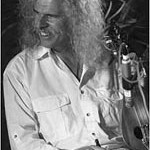- country:Greece
- region:Balkan
- label:Seistron
- type:Composer/Songwriter
- gender:male
- instrumentation:instrumental
- artist posted by:Applaud! Productions
Links
In the Labyrinth of Ross Daly's music
By Eleni Kallimopoulou
(extract)
The music and personality of Ross Daly make him a compelling player on the European World Music stage. In his music he draws upon a number of popular and classical idioms mainly from the Balkans and Middle East, but also from North Africa and Central and South Asia, incorporating elements of each into his compositions and renditions of traditional repertoire. His live performances are a true sonic and visual treat; the audience is presented with a wealth of instruments used in these various traditions, played by an equally multi-ethnic group of musicians. What is perhaps most notable about his music besides its eclecticism, is its plasticity, as Daly has an extreme gift for merging idioms, without however resorting to facile appropriations or pastiche practices. But although his music contains something of the various traditions he has been working with, it is something beyond any one of these. His compositions have a quality distinctly his, and often work in time: there is a build-up effect created through repetition and acceleration in tempo. His concerts, too, are made up of lengthy uninterrupted sets in which alternation between improvisatory and pre-composed pieces and the progression from slower to faster tunes generate musical affect and an almost esoteric ambience.
Behind this quite remarkable musical accomplishment lies Daly's long-lasting commitment to the study of traditional musics, one which unsurprisingly predates the fairly recent "World Music" phenomenon.
Born in England of an Irish family, because of his father's profession Ross Daly spent his childhood in a variety of places in England, Ireland, Canada, Japan, and the USA. His first musical contact was with the European classical tradition (he played the cello and the guitar) but soon he was drawn to the 'East'. Over the years, Ross engaged with a number of Eastern musical traditions which he studied in-depth and in their cultural context. In the 1970s he made trips to India, Afghanistan and Iran, and studied Indian and Afghan music with master musicians. He then settled in Crete, Greece, and immersed himself in the world of Cretan music and the lira, which he learned next to Kostas Moudakis, one of the leading exponents of the style. During the '80s he also developed an interest in Turkish folk and art musics, travelling back and forth to Istanbul to take lessons from master musicians including kemence virtuoso &304;hsan Oezgen.
As a result, Daly plays an impressive range of stringed instruments, plucked and bowed, and masters especially the Cretan lira and boulgari, the Turkish ud and the saz, the Afghan rubab, and the Egyptian rabab. Having acquired the instruments' technique through training with exponents of each tradition, he has a firm acquaintance with their cultural milieu, and an understanding of instruments and their tradition as an integral whole. His interest in the actual musical culture of each respective traditional instrument is bound together with a high regard for traditional folk musicians, who have been a source of inspiration to him throughout his musical explorations. Despite this open recognition, and though at times he can "actually function as an exponent of a particular tradition in its pure form" , Daly does not consider himself to be doing 'traditional' music. "What we do is not traditional music per se, but it does draw, almost exclusively, on elements of specific and, usually, closely related musical traditions which are continuously developing, each in its own way" . To Daly tradition is a "collective effort of an uncountable number of people, over a perhaps equally uncountable number of years". Though no individual can ever supersede it, it in turn can do nothing on its own, being wholly dependent on the contribution of single individuals. In what is an interaction between the world of the individual and that of the tradition, individuals have to bring in their own, contemporary point of view. Merely copying previous forms, conversely, does not serve tradition .
Based on a principle of inclusiveness and of exploring cultural affinities between closely related traditions, Daly's work transcends cultural and geographical boundaries which sometimes remain all the same ardently affirmed. This may partly explain why his music resonates both in the transnational music market, and locally.







